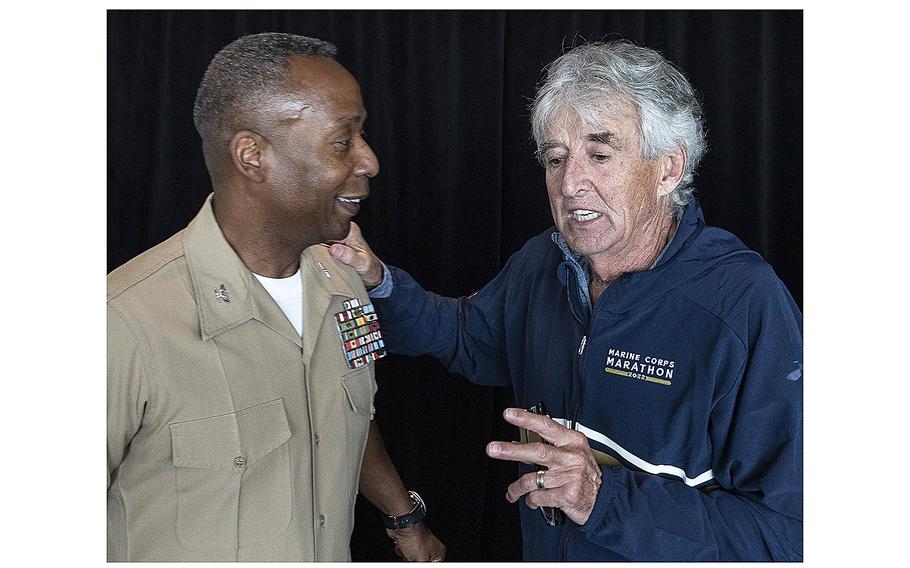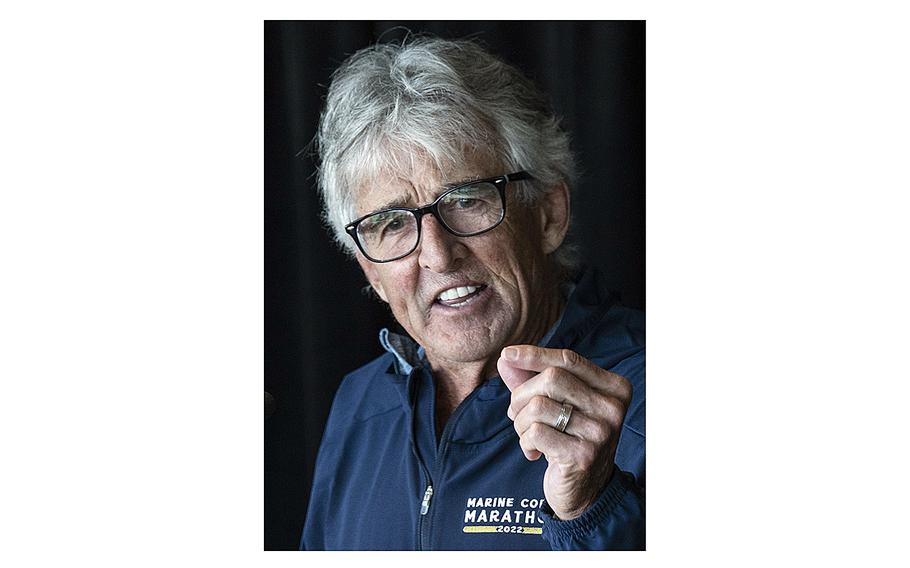
Olympic marathon champion Frank Shorter talks with Col. Michael Brooks, Marine Corps Base Quantico commanding officer, after Friday's Marine Corps Marathon press conference in Arlington, Va. (Joe Gromelski for Stars and Stripes)
ARLINGTON, Va. — When Frank Shorter shocked the sports world by winning the marathon at the 1972 Olympic Games, there was no such thing as the Marine Corps Marathon, and long-distance running in the U.S. was pretty much confined to a dedicated group of intense, wiry individuals.
After Shorter brought home the gold medal – the first by a U.S. marathoner since 1908, and no American has won it since – distance running took off in this country. Numerous races joined the venerable Boston event on the annual marathon schedule, and in 1978 the U.S. Marine Corps first sponsored what would become an iconic 26.2-mile race through the streets of Washington, D.C. and its environs.
This weekend, Shorter is in the nation’s capital as an ambassador of the Marine Corps Marathon for Sunday’s 47th running, and on Friday he talked about his 1972 Olympic triumph at Munich and its aftermath.
“At that point, Americans weren’t considered endurance athletes,” he said. “I wasn’t one of the favorites, even though I was coming up very quickly. I was just, in a way, an average, normal American from upstate New York who just got better and better at what he was doing in college (at Yale) and got out of college and decided he wanted to go to the Olympics ... but just in case, I’ll go to law school. So, I went to law school in Florida full time, and then trained for the Olympics. So, I win, and I think it just surprised a lot of people.”
And prompted many of them to lace on some track shoes and hit the roads.
“I think what happened is, (Americans) didn’t realize that it was really a part of American culture – that ability to sort of endure and just constantly work at something and have a goal and be able to focus on that goal, and anyone can do it,” Shorter said. “I think I kind of demystified the distance. The fact that, ‘well, if (Shorter) can run that far, I can do that.’
“The best example I have is (four-time Boston Marathon champion) Bill Rodgers, who was another person in the running boom. He was a smoker at the time, watched me in ‘72. We had run against each other when we were in college, and the way I put it is, he probably put out his cigarette and said, ‘I can do that,’ and became one of my big rivals. So, he was another part of that puzzle.”

Olympic marathon champion Frank Shorter speaks at Friday's Marine Corps Marathon press conference in Arlington, Va. (Joe Gromelski for Stars and Stripes)
But Shorter believes there was more to the 1970s running boom than the performances of a few individuals.
“The other part of it was, at the time, health and fitness were being quantified through research,” he said. “You had people like Kenneth Cooper, he came up with the term ‘aerobics.’ That was his book. Then there was this guy named Jim Fixx, who wrote a book on running. So, it was a combination of a lot of those things, and I think when people first started to do it they realized it was stress relief. And that’s what it was for me in college.
“For a lot of Americans, there’s something about us, we just like to go out there and put one foot in front of the other.”
All that running can take its toll, though, especially for those who have trained at a high level.
“I went out and walked six miles this morning,” Shorter said, “and it was apparent when I was getting up there on the stage (at the Marathon press conference). Over time, orthopedically, you just are going to pay that price. People now realize that and go to softer surfaces, and the new shoes are very good about giving much more cushion and protection.
“But it’s inevitable. One, you get older, and two, we all have what I call ‘orthopedic limit.’ Over time, at a very high intensity of training, your body is only going to last so long. No matter who you are. There’s a window, and eventually for some people it’s two or three years, some people it can be six, eight years. I was about eight years, nine years.”
Shorter recalled that for him, the moment of truth came “in the middle of a race (in his hometown of Middletown, N.Y., in 1982). I was winning, and I was beating Rod Dixon, who was the number-one-ranked road racer in the world at the time, and I said to myself, ‘this is harder than it should be.’ And I realized, I was 35, and I just knew. So, at that point, my goal – really, right in the middle of the race – I said, OK, from now on, my goal is to slow down as slowly as possible. I know I’m slowing down, but whatever I can do to sort of mitigate that, as I go down, that’s what I’ve tried to do.
“But again, it’s like this morning – sometimes you overdo it. It’s a club. It’s called the ‘do as I say, not as I do, track club.’”
47th Marine Corps Marathon
When: Sunday, October 30, 2022
Where: Start and finish lines: Arlington, Va.
Starting time: 7:50 a.m.
Other races on Sunday: MCM 10K (6.2 miles), MCM 50K (31 miles).
For more information, go to the Marine Corps’ marathon website.